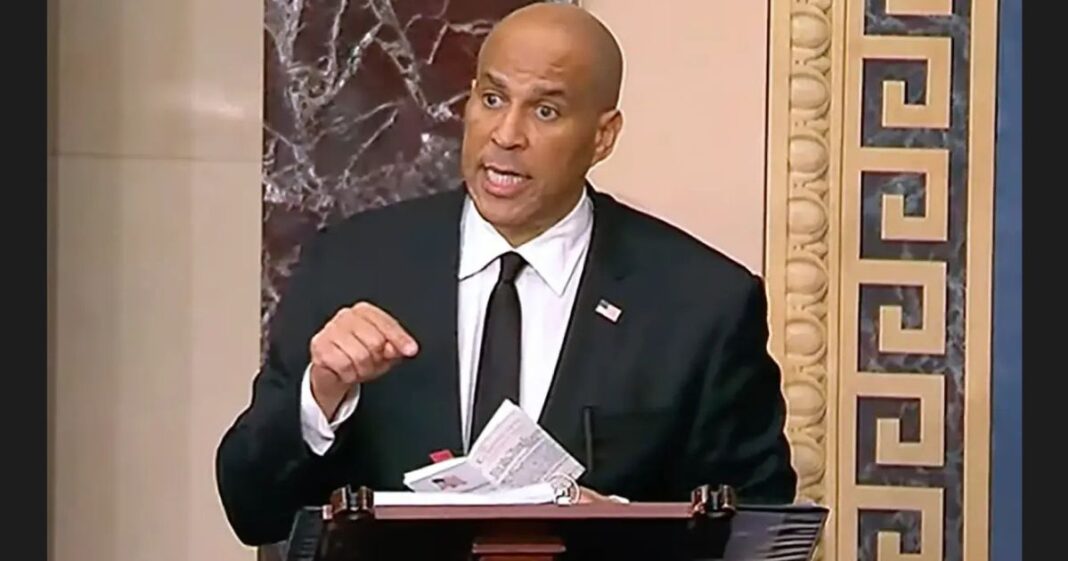This article was originally published on Word In Black.
After weeks of watching President Donald Trump playing fast and loose with the most powerful office in the world — and seeing his party, condemned to minority status in Congress, fecklessly stumble around Washington without coordinated or meaningful pushback — Sen. Cory Booker, a New Jersey Democrat, decided he’d had enough.
It was time to stir up what his hero, civil rights icon John Lewis, called “good trouble.”
Around 7 p.m. Monday, Booker stepped to a lectern on the Senate floor and began a marathon speech designed to disrupt the Senate’s regular order, serving notice to the White House and his legislative colleagues.
By the time he finished, around 8 p.m. Tuesday, some 25 hours later, Booker, who is Black, had given the longest speech in Senate history. He broke the record held by Sen. Strom Thurmond — a segregationist who set it in 1957 while attempting to block civil rights legislation — by more than 40 minutes.
In the process, however, the event evolved into something greater than a disruption.
The speech racked up more than 350 million likes on TikTok Live; hundreds of thousands of viewers tuned in via livestream on YouTube and other social platforms to watch Booker beat Thurman’s record. But it also became a rallying cry for Booker’s beleaguered party.
And, at a time when the Trump administration is literally trying to erase the civil rights movement from the law and history books, Booker delivered a powerful political victory for Black America, repeatedly invoking Lewis’s name along the way.
“This Is How It’s Done”
“Senator Cory Booker is showing America what real leadership looks like: genuine heart, fierce compassion, relentless dedication, and brilliant integrity,” one user, @thejenniwren, wrote on Bluesky. “He’s teaching a masterclass in humanity — and making history while he’s at it. America, take notes. THIS is how it’s done.”
As Booker’s speech went deep into Tuesday afternoon, some 30 Senate and House Democrats used chamber rules to give him breathers. Sen. Chuck Schumer of New York — the top Democrat who had to cancel a planned book tour because of liberal anger over his decision to help Republicans dodge a government shutdown — cheered Booker on, calling his performance a “tour de force.”
“Do you know how proud your caucus is of you?” Schumer told Booker, to loud applause. “Do you know how proud America is of you?”
Getting in “Good Trouble”
A former candidate for the 2020 Democratic presidential nomination, Booker had contemplated a drastic gesture to demonstrate the danger of Trump 2.0. Late last week, Booker concluded the nation teetered on the edge of crisis, and had reached a “moral moment” that required him to take a stand.
He began by quoting John Lewis — “He said, ‘Get in good trouble’” — then declared, “I rise with the intention of disrupting normal business of the United States Senate for as long as I am physically able.”
From the start, Booker assailed what he called Trump’s assault on democracy, his overturning of Democratic norms and his plan to slash entitlements to fund a tax cut for the rich. Over the course of the speech, his voice boomed and fell; he grew hoarse but continued. He demanded accountability, and urged his fellow citizens to rise up and oppose the president’s agenda.
“This is the moment where our most precious ideas of our country are being tested,” he said. “Where does the Constitution live: On paper? Or in our hearts?”
Booker even mentioned Thurmond, a South Carolina Dixiecrat-turned-Republican who likely could not have conceived of a Black senator, much less one who could challenge his record.
“To hate [Thurmond] is wrong,” Booker said, yet “maybe, just maybe, I could break this record of the man who tried to stop the rights upon which I stand. I’m not here though because of his speech. I’m here despite his speech. I’m here because as powerful as he was, the people were more powerful.”
“Redeem the dream.” –– Sen. Cory Booker
At 7:20 p.m. Tuesday evening, after surpassing Thurmond, cheers for Booker broke out, but he kept going. About 40 minutes later, Booker wrapped up the speech about a half-hour later, ending it where it began: by quoting Lewis.
“He said for us to go out and cause some good trouble, necessary trouble, to redeem the soul of our nation,” Booker said. “I want you to redeem the dream. Let’s be bold in America.”
Later, during an interview with MSNBC host Rachel Maddow, Booker said he was “definitely hurting a little bit, but I’m strong in spirit. I’m feeling a lot of gratitude.” He said he decided to deliver the speech after getting an earful from his constituents after the Senate passed the government funding bill.
But he also acknowledged that Thurmond’s record was a motivating factor.
“Strom Thurmond’s speech always really irked me,” he told Maddow. ”As we got closer, it became more and more important to me.”
Some online critics dinged Booker’s speech as little more than political theater, but political strategist Brittany Packnett Cunningham thought otherwise. She pointed out on Instagram that Booker reminded people that “authoritarianism is not normal” and “the spirit of protest is about disrupting business as usual.”
If Booker inspired folks to take action, Packnett Cunningham laid out several suggestions, including using “the app 5 calls or the website 5calls.org to call your senators and members of Congress to push them on the issues that Cory Booker was talking about.”
After all, as Booker pointed out, “Yes, things are tough right now. They’re hard. They’re scary. But we can overcome this.”




